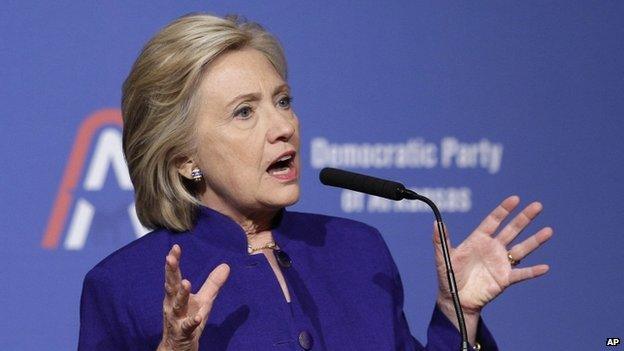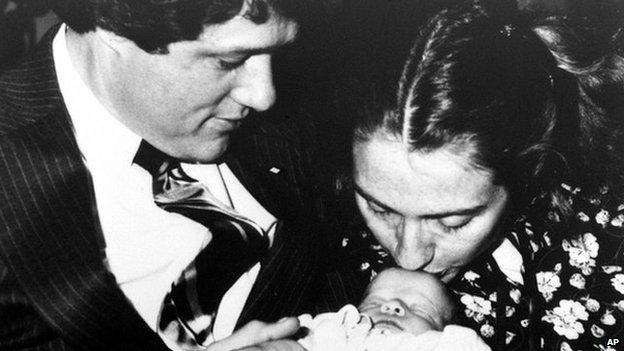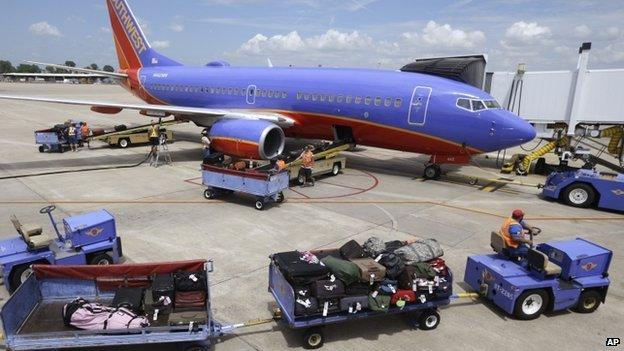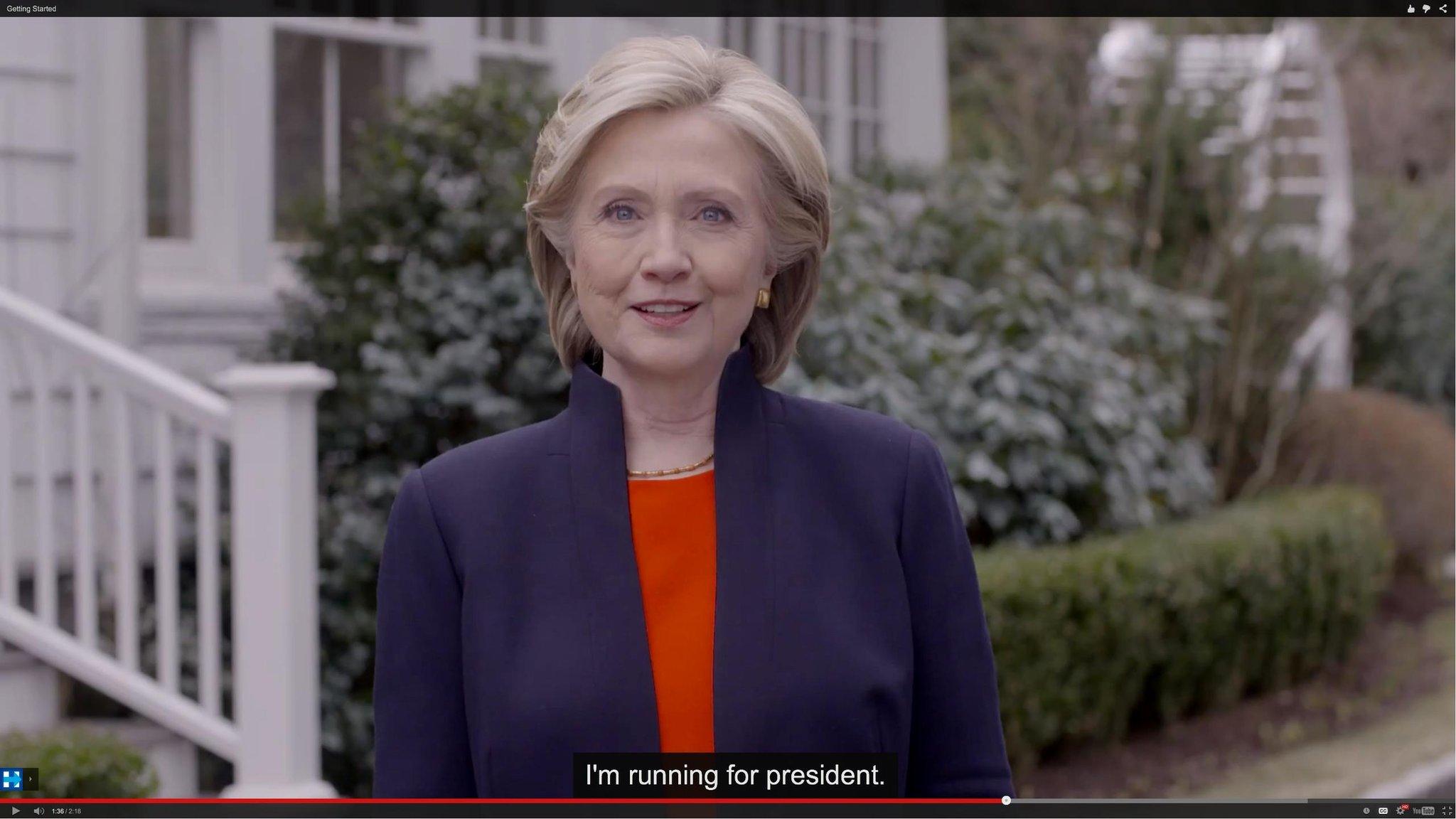How Hillary Clinton envisions her path to victory
- Published

Mrs Clinton speaking in Little Rock
The airport in Little Rock is named Bill and Hillary Clinton National Airport; the arrivals hall has a wall adorned with pictures of the former presidential couple.
In the Clinton presidential library, which overlooks Arkansas River, Hillary's presence is almost as prominent as Bill's - though the gift shop sells mugs printed with, "I still miss Bill."
Everywhere you go in Arkansas, you are reminded that this was once the land of Bill and Hillary Clinton, from 1974, when Hillary first joined Bill in Fayetteville, until 1992, when the couple left the governor mansion in Little Rock to move to the White House.
This is where the power couple made their debut on the national stage, where Mrs Clinton's southern friends say the northerner learned about a politician's touch, and where she last had an everyday life, able to drive her own car, living in a brick house on a quaint street in the leafy Hillcrest area when they first moved to the city.
The journey she's been on since with her husband, and separately as senator, candidate and secretary of state, is a reflection of America's own transformation, and one in which Mrs Clinton has sometimes been ahead of her compatriots on social issues, such as early childhood education, external, paid maternity leave or healthcare (though not on others, like gay marriage, external).
In the deep south, few have forgotten she was the rebel who initially kept her maiden name after marrying Bill - it was the first thing several women in Little Rock mentioned when I asked them their opinion about Mrs Clinton.
"But we grew to like her," said 69-year-old Jan Baker.
"She did great for Arkansas, she was smart and far-sighted and looking to the future."
Democrat advantage
Though Mrs Clinton now fits the times better, Arkansas has become a red state that has not voted Democrat in a presidential race since it voted for president Clinton in 1996.
Republicans also dominate state and local offices.

Clinton raised her family in Arkansas
So when Hillary Clinton came to speak at a Democratic fundraising dinner in Little Rock on Saturday to an audience of 2,000 people, she was coming home to a changed state, which reflects the challenges that the Democratic Party has faced in recent local and congressional elections.
During the dinner she appealed for voter enthusiasm.
But if the state where Mrs Clinton lived for more than 15 years has slipped through the Democrats' hands, the rest of the country is becoming less right-leaning with every election.
By the mere fact of changing demographics, and the growing size of the non-white electorate, Democrats now start out the race with a built-in advantage of several points.
Republican pollster Whit Ayres who recently published a book - 2016 and Beyond - has laid out the demographic problem in very stark terms for Republicans; for instance a Republican candidate would need to win 40% of the Hispanic vote to get to the White House.
It's unclear if either Senator Marco Rubio, whose parents came from Cuba, or Jeb Bush, brother of George W Bush and former governor of Florida whose wife is Mexican, can pull that off.
Mr Ayres's other conclusions were neatly summed up in a Washington Post article, external.
"Based on estimates of the composition of the 2016 electorate, if the next GOP nominee wins the same share of the white vote as Mitt Romney won in 2012 (59%), he or she would need to win 30% of the non-white vote."
The piece went on to add it was a daunting obstacle considering that "Romney won only 17% of non-white voters in 2012. John McCain won 19% in 2008, George W Bush 26% in 2004."
A key former Obama adviser, Dan Pfeiffer, tweeted out the excerpt, saying this was all you needed to know about the 2016 election: "The rest is all noise."
Media noise
And there has always been a lot of noise around the Clintons and it continues today with her second run for president.
She is ahead in all the polls against her Democratic rivals, and in national polls in a contest with every Republican candidate (she loses in some swing states).

Jeb Bush and Mario Rubio both have Latino family members
But the headlines are mostly about her use of a private email server, external at the State Department, allegations of impropriety with foreign cash donations, external to the Clinton foundation, a perception that the Clintons run an empire and pursue money with large speaking fees.
Then there is the never-ending Republican investigation into the Benghazi attack, external which killed an American ambassador and three other Americans, while Mrs Clinton was secretary of state in 2012.
Beyond national polls, the Clinton campaign is looking at demographics and the mood of the electorate.
If Clinton's 2008 bid for president seemed focused on her, giving off a sense of entitlement and inevitability, this campaign is focused on the issues.
Whether on immigration, race, gay marriage, family and gender equality issues, even on renewed diplomatic relations with Cuba, opinion polls show the country leans liberal.
Mrs Clinton has slowly been unveiling a set of policy proposals, from dealing with college debt to expanded access to childcare, a higher minimum wage, all of which are about boosting the middle class and raising wages.
A key line in her stump speech is that she wants Americans to be able to do ''more than just get by, you can get ahead and stay ahead".
Many of the proposals still lack details and she has yet to explain how she will pay for some of this.
Pull to the left
One of her challenges during the primaries will be to resist a pull too far left on the economy or social issues, which could damage her in the national vote.
In the general election, she will be aiming for a large centre, hoping to reach beyond women, African Americans and Hispanics, to net large numbers of independents or even Republican-leaning voters who are turned off by the party's position on issues like gay marriage, but feel she's tough enough on foreign policy.

Mrs Clinton was a high-profile secretary of state
Looking at some of her policies, Mrs Clinton appears to want to have the biggest impact possible if elected president, ringing alarm bells in conservative circles.
"We can only do so much through Washington, we have to come up with creative solutions to these big problems that involve everyone: private sector, the philanthropic sector, cities, states," a campaign aide told the BBC.
"It's not a big government approach, it's more like a big enterprise approach to taking the country forward."
But there are other more worrying polls that show a majority of voters in swing states find her untrustworthy.
Likeability factor
Democratic supporters quietly confide they worry that no matter how good Mrs Clinton's policies are, her elusive likeability will undermine her message.
The gap between her warmth and ability to connect with people in small settings and the coolness she can project while on a larger stage remains a mystery to her friends.
It's a challenge for her campaign team who also struggle to project freshness and fight the narrative she's the "establishment" candidate.
Her combative relationship with the media and inconsistent performance in national television interviews since she left the State department are also a concern because they add to the impression she is detached and sometimes tone-deaf, as in with her comment about being ''dead broke'' when she and her husband left the White House.

How it all started for Hillary Clinton
Hillary Rodham Clinton
Born 26 October, 1947, in Chicago
Graduated from Yale Law School in 1973
Married Bill Clinton in 1975
1993-2001: Campaigned for expanding health insurance and women's rights as first lady
Elected New York senator in 2000
Re-elected by wide margin in 2006
2008: Failed bid for Democratic Party presidential nomination
2009-2013: Secretary of State

But EJ Dionne, Washington Post columnist and author of the forthcoming book, Why the right went wrong, about conservatives in America, says the likeability factor is overrated.
"Clinton and (campaign chairman John) Podesta place more value on carefully worked out positions on issues," said Mr Dionne.
"As long as the vehicle is acceptable, voters vote for who they believe is going to deliver for them. Republicans can't make the offer she's making", especially on wage stagnation.
If Mrs Clinton does win, it will also be because of the Republican party's failure to appeal to a majority of Americans on social and economic issues.
The large field of 16 candidates will force them to outdo each other on extreme views to win the nomination.
In Little Rock, the fundraising dinner programme included an ad by a local group of companies that proclaimed: "We have been ready for Hillary since 1975."
'Smarter than Bill'
In reality, the idea of Mrs Clinton running for president probably didn't cross anyone's mind then, perhaps not even hers.
One of her friends in Little Rock, Sheila Bronfman, told me she doesn't remember thinking back then that Mrs Clinton would run for president, though everyone "always joked and rather believed that Hillary was smarter than Bill".
"She's poised" for this moment, Mrs Bronfman said.

The airport in Little Rock is named after the Clintons
A provocative piece, external in Politico magazine by Doug Sosnik, former adviser to Bill Clinton, argued that the election is already over because "job approval ratings of the incumbent, regardless of whether they are running for re-election, serve as a proxy for the electorate's mood and have historically been the most accurate predictor of election outcomes".
Barack Obama's approval ratings hover just below or above 50%.
In other words, Democrats could be set to keep the White House, achieving the historic feat of bringing a woman to the presidency and having a Democrat elected to succeed a two-term Democratic incumbent for the first time since the early 1800s.
But Clinton's aides know that much can change before November 2016 and they are keeping a close eye on the wild cards: a slump in the global economy that could still dent the US recovery and have an impact on Mr Obama's approval ratings; an attack on American soil, or even the unravelling of the nuclear deal with Iran.
All other things being equal, the maths of the 2016 election indicates it may indeed already be over, but it's still going to be a long hard slog for Hillary Clinton.
- Published21 July 2015
- Published12 April 2015
- Published12 April 2015
